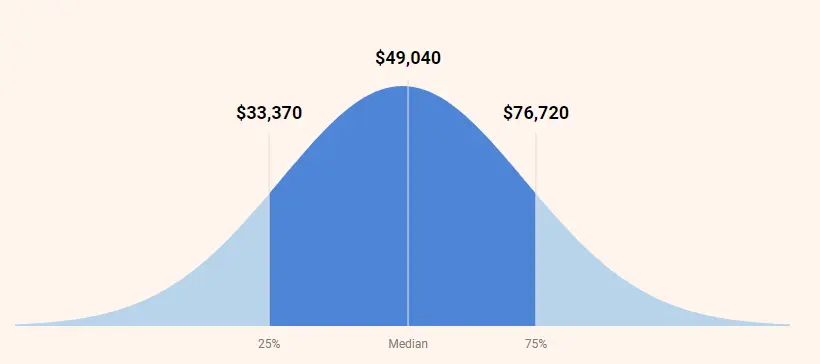
The market boom of recent years has caused many people to wonder if real estate might be a good career for them. In fact, more than 156,000 individuals chose to pursue a career in real estate in 2020 and 2021, a 60% increase when compared to the two years before that.
Real estate can be a great career choice for some people, especially those who appreciate a flexible schedule and don’t mind commission-based earnings. But for people who value stability and can’t work outside normal business hours, real estate might not be the best choice.
If you’re considering a career in real estate, read on to figure out where your strengths and desires fall in that decision-making spectrum.
A career in real estate can be very fulfilling for the right person. Those who are self-motivated and like to network with others can often find a good fit in the real estate market. On the flip side, some people find that the commission-based income and irregular schedule isn’t the best environment for them personally.
Let’s take a deeper look at the pros and cons of life as a real estate agent, so you can determine whether or not real estate is a good career for you.
In general, real estate agents seem to have high job satisfaction, a fact that indicates there are many pros to choosing a career in real estate. A recent survey shows that 84% of real estate agents are happy in their career, whereas only 53% of all those surveyed (from a variety of fields) would say the same.

Image source: Market Leader
Here are some of the benefits related to pursuing a career in real estate.
When compared to other professions in the same earning bracket, it’s really not that difficult to become a real estate agent. No degree is necessary to enter the field, though there is a procedure for licensing.
To obtain a real estate license, a prospective agent can expect the following process:
With the right amount of focus and stamina, a person can reasonably obtain their real estate license within a few months’ time, making ease of entry a clear benefit to a career in real estate.
Real estate agents enjoy the flexibility of being their own boss and setting their own schedule. Even though agents are affiliated with a brokerage, they are technically seen as independent contractors. The agents within a brokerage often develop a team atmosphere, but because of the fiduciary nature of the agent-client relationship, each of the agents really work as individuals.
The biggest perk of being your own boss is setting your own schedule. Real estate agents can flex their work hours around family commitments, hobbies, committees, and so forth. Some newer agents even choose to do real estate work around another part-time job while they build momentum in their local market.
This kind of flexibility makes real estate a good career for many individuals, including parents, caretakers, real estate investors, volunteers, and more.
Many people are drawn to a career in real estate because of the financial benefits. Real estate agents are paid on commission, which means that the more sales they close, the higher their income will be. Also, as agents gain experience, they’re able to network with more high-end clients which could increase their commission earnings on each transaction.
In a real estate deal, the real estate commission is usually around 5% to 6% of the sale price. The buyer’s agent and the seller’s agent generally split that commission equally, so each agent is looking at a commission of 2.5% to 3%. That means, on a $300,000 home sale, a real estate agent would be looking at grossing around $7,500 to $9,000.
According to the Bureau of Labor Statistics, the median income for real estate agents across the country is around $49,000 per year. That figure varies greatly based both on location and the personal drive of the agent, of course. But overall the potential to earn a decent income is certainly worthy of the “pro” column when determining if real estate is a good career.

Image source: US News & World Report
Real estate can be a good career choice for people who like to connect with others and enjoy networking. Successful real estate agents are constantly building a future client list. An ever-expanding professional sphere of influence helps to create leads that eventually could close more deals.
Many agents also enjoy being a part of a pivotal moment in their clients’ lives. Purchasing or selling a home is a major life event, and a real estate agent has the privilege of walking people through those processes. The feeling of helping people brings about job satisfaction that can certainly be considered a benefit within real estate careers.
While a career in real estate has many attractive features, it’s not a good career for everyone. According to the New York Times, only an estimated one out of every ten agents decides to make real estate a long-term, full-time career. Other sources project similar numbers, saying that 80% of new real estate professionals never renew their licenses at the two-year mark.
Let’s take a closer look at what might be making those agents leave the industry. Here are a few of the drawbacks to a career in real estate.
There are significant out-of-pocket costs related to practicing real estate, many of which don’t get talked about openly. Some agents––particularly newer agents––are unaware of how these costs add up and affect their profitability.
As mentioned above, entry into the field is relatively easy; likewise, the start-up licensing costs are not exorbitant. Education courses run in the range of $180 to $1000 depending upon the type of instruction and the required classes. Initial licensing fees will cost $75 to $615 depending upon the state of licensure. While that’s not exactly chump-change, one could argue that education for other fields is much higher.
A real estate agent is also responsible for some regular and unavoidable costs of doing business. For example, an agent can expect certain recurring dues and fees in order to continue practicing their career. These numbers can vary based on location, but in round numbers, one could assume the following:
When you add all these line items up, the estimated yearly cost for dues and fees comes in around $1,200 for real estate agents.
In addition, real estate agents must pay a brokerage split out of their commission. The agent’s brokerage provides office space, marketing materials, lead generation, and administrative support. To compensate for those items, the brokerage receives a portion of the agent’s commission from every sale.
The typical brokerage split is 50/50, though there are exceptions to this based on the broker’s business model and the services provided to the agent. So in the example above, if the agent’s commission was $9,000 on that $300,000 home sale, then the agent would owe the broker $4,500 from that transaction.
If a broker requires less than 50% in a commission split, that usually means there’s less support offered to the agent. In some brokerage business models, more experienced agents can opt for a better split and in return receive fewer (or no) leads. Since agents tend to build solid momentum over time through good referrals (rather than leads), getting a better split can be one way to reduce this cost and increase income.
When it comes to listing a home, some marketing costs may be covered by the brokerage, but any additional marketing efforts would come off of the agent’s bottom line. Possible costs might include:
As you can see, the earnings per transaction begin to dwindle when adding up all the associated costs. These costs need to be taken into account when considering whether real estate is a good career or not; some prospective agents see the gross commission and forget to subtract these very significant costs.
Assuming that the brokerage doesn’t cover these costs, the agent would be looking at an income of around $3,675 on the hypothetical sale we’re following.
But wait––don’t forget about Uncle Sam! As independent contractors, real estate agents are subject to self-employment tax. This tax is in addition to income taxes and is designed to cover things like Social Security and Medicare which would be taken out of a salary or hourly employee’s paycheck.
The self-employment tax rate is currently 15.3%, which means that on this home sale, the agent should set aside another $562 for taxes.
So with all these costs considered, in round numbers, the real estate agent actually would take home closer to $3,000 on the sale of a $300,000 home.
It’s also important to note that agents only get paid if and after a sale closes. That means, there could be countless hours that go unpaid if a house never sells or a buyer opts not to purchase. And with closing times sometimes soaring over 45 days, it also means waiting a long time between the hours worked and the compensation earned at the closing table. These time costs are a real drawback for many agents.

Another drawback to a career in real estate is the instability of the market. Sure, there are periods of time –– like the most recent surge of 2021 –– where values rise, there’s a rush to buy, and homes seem to basically sell themselves. But just as often there are periods of market decline –– like the crash of 2008 –– where values drop, buyers are reluctant, and homes sit on the market for months.
Local real estate markets can also experience a seasonal boom-or-bust pendulum swing, with homes selling fast in the summer then nothing happening during the holidays. A real estate agent often needs to adjust both their budget and their schedule to accommodate these cycles on an annual basis.
Real estate certainly feels like a good career choice when the market is thriving! But when it’s faltering, well, most agents can only make it so long without a commission check coming their way.
As mentioned above, the flexibility of a real estate agent’s schedule is considered a “pro” for many individuals. But on the flip side of that same coin, in order to accommodate clients’ needs, an agent often must work an irregular schedule.
Consider a young couple who is looking to get out of their apartment and into a starter home. They likely work a normal nine-to-five schedule and lack the seniority to go to house showings in the middle of the day. Representing these buyers means scheduling showings in the evenings after they get off of work.
Or think about the family who is relocating from out of town. They might have one or two weekends to scout out houses while navigating their job transitions and current home sale. Being their agent means doing a blitz of multiple showings while your friends and family enjoy a relaxing weekend.
Even representing a seller will often require after-hours work as you develop a marketing plan, complete administrative tasks, field questions from buyers’ agents, and host open houses on the client’s behalf.
For some individuals, the flexible schedule isn’t enough to offset the negative effects of an after-hours schedule, making this a drawback to a career in real estate.
Another, perhaps lesser-known “con” to a career in real estate is the state-specific rules of licensure. Some states recognize and honor a real estate license obtained in another state; after completing a state-specific portion of the real estate salesperson test, an agent can continue to practice without delay.
Many other states are limited or restrictive in their license reciprocity. They may honor licenses granted in select states, or they may not honor out-of-state licenses at all. That means a real estate agent who moves to a different state may have to start the entire process of education and licensing all over again.
Since that type of limited scope isn’t common in many other fields, some agents –– specifically those who may need to make big moves for a spouse or partner –– would consider that lack of recognition a drawback to a career in real estate.
The National Association of Realtors has over 1.5 million members and estimates that there are approximately 3 million active real estate licenses nationwide. If the above mentioned satisfaction survey is any indication, that means millions of Americans would say that real estate is a good career.
But as with any decision, the choice to pursue a career in real estate comes down to personal preference. Individuals should always weigh the pros and cons as they relate to their personal situations. Do the benefits of flexibility and earning potential overcome the drawbacks of instability and irregular hours? If they do, maybe real estate is a good career choice for you.
At New Western, we’re working to disrupt the real estate industry, and part of that goal means approaching a career in real estate a little differently. New Western agents specialize in connecting investors with the properties that fit their portfolio best. With a more pinpointed market niche, our agents find that they have a more focused schedule. Working with investors can also mean quicker closings, which takes out a bit of instability from the equation. And to top it all off, our agents usually earn more than agents working at traditional brokerages.
If you think that real estate would be a good career choice for you, consider connecting with our team. Let’s talk about how New Western’s agent career path outshines the typical real estate agent experience.
Tap into in-depth, industry-leading education resources from articles, videos, guides, and reports every week, and get ready to take action in your real estate investing business.
Disclaimer: The information provided on this website does not, and is not intended to, constitute legal advice; instead, all information, content, and materials available on this site are for general informational purposes only.